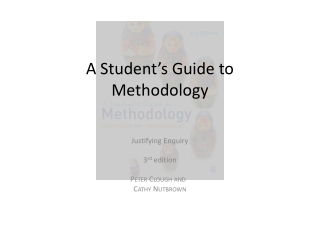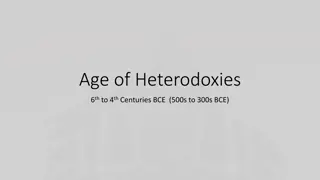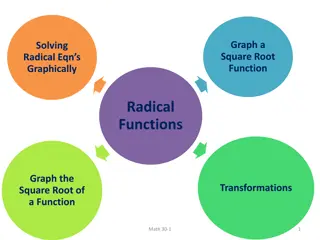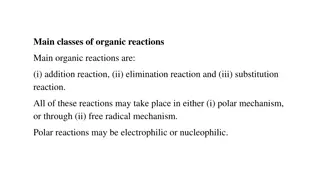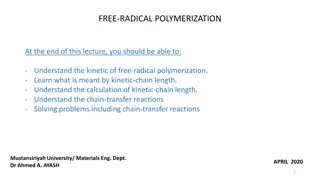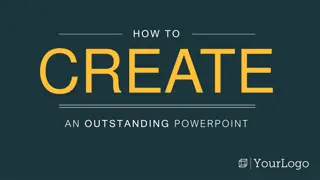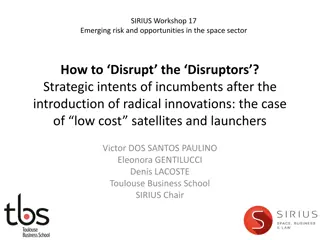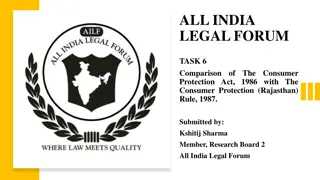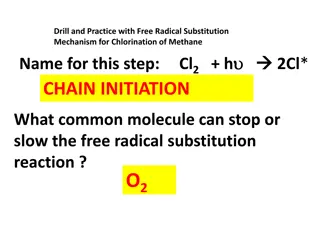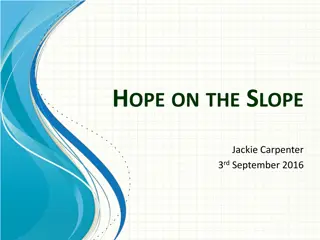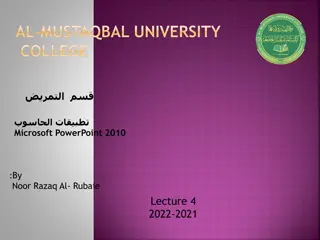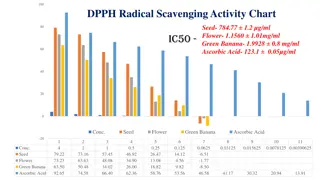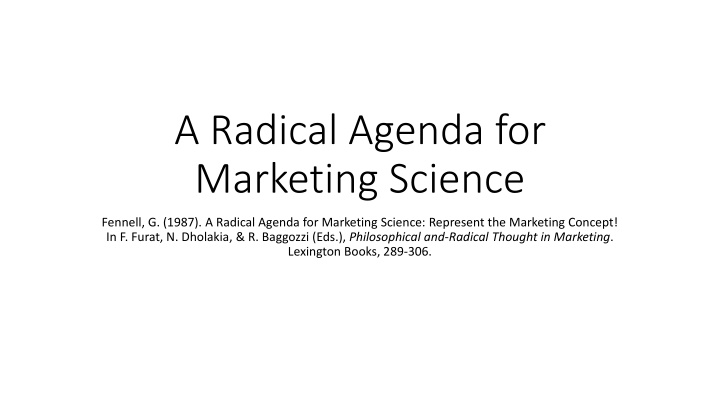
Radical Agenda for Marketing Science: Innovating Marketing Concepts
Explore the radical agenda for marketing science presented by Geraldine Fennell, emphasizing the importance of creating value before production, distinguishing marketing from selling, and fostering ongoing processes to meet customer needs effectively.
Download Presentation

Please find below an Image/Link to download the presentation.
The content on the website is provided AS IS for your information and personal use only. It may not be sold, licensed, or shared on other websites without obtaining consent from the author. If you encounter any issues during the download, it is possible that the publisher has removed the file from their server.
You are allowed to download the files provided on this website for personal or commercial use, subject to the condition that they are used lawfully. All files are the property of their respective owners.
The content on the website is provided AS IS for your information and personal use only. It may not be sold, licensed, or shared on other websites without obtaining consent from the author.
E N D
Presentation Transcript
A Radical Agenda for Marketing Science Fennell, G. (1987). A Radical Agenda for Marketing Science: Represent the Marketing Concept! In F. Furat, N. Dholakia, & R. Baggozzi (Eds.), Philosophical and-Radical Thought in Marketing. Lexington Books, 289-306.
A great deal of resources are devoted to producing goods and services to satisfy human wants and needs. The efficacy of these offerings matters. Taking instruction from our failures and inspiration from those who would improve the human condition, we may extend our understanding and do better in the future. Such has always been the promise of science. It is time for marketing science to deliver. Geraldine Fennell
Comments by John Story The purpose of this article is to remind marketers of their role in society and in business position marketing activities upstream of production, selling, and consumption, where they can have the greatest impact explain and position the marketing concept as a strategic element, rather than as an altruistic action, or decision differentiate marketing from selling encourage marketing science to focus on ongoing processes identifying circumstances that result in wants and needs facilitating customer satisfaction by responding to needs and wants
Fennells Motivation for this article Return to our roots Provide the prospective of a professional marketer, who is responsible for making a profit, in contrast with marketing academics. Position marketing as occurring before production Position demand as preexisting products
A few key points Demand preexists products and brands Marketing has the greatest potential for value creation before deciding what to produce Marketing is not selling, and selling is not marketing Marketing wants to participate in ongoing processes Marketers must first discriminate between prospects, non-prospects, and targets Markets consist of occasions, not of consumers Products and services sold measure demand served in a given period, but are not equivalent to demand
Marketings Function as conceived by Fennell Bridge the gap between producer and consumer created by division of labor Firms should make for you what you would make for yourself Return to users control over what is produced Two charges for marketing Production reflects the influences (psych and non-psych) that users experience Producers should be, in effect, an extension of the user s mind and body
Marketing Science Marketing Science Premarket Environment Firm Marketing Science Endowments Usage- Situation as Perceived Product Offerings Marketing Science Personal Variables Market Knowledge Wants/ Needs Attributes/ Benefits
Business View of Marketing The Division of Labor means that people other than users decide what is produced The marketplace serves to minimize this issue by penalizing users whose offerings are less desirable (useful) Hence, the marketing concept Do not sell what you happen to make; make what the customer wants to buy. This should come into play before deciding what to produce, when it has the most value and impact
The Essence of Marketing (1) Society must restore communication between producers and users This is key to producers survival Marketing science serves (should serve) as an intermediary between producers and consumers They must understand the natural processes that create wants and satisfy those wants What conditions result in the allocation of resources to effect change in their situation? (Which wants and needs justify the creation of products?)
The Essence of Marketing (2) Primary domain of marketers What shall we offer to the market? (This is where and when marketers can have the greatest impact. Once products are designed and produced that potential diminishes greatly.) Ensure that the firm s offerings respond to some set of conditions which result in perceived wants. Implications The Marketing Concept is not altruistic Selling is not part of marketing (It is downstream of marketers domain.) Marketers do not create demand Marketers want to participate in ongoing behavior, not change it
The Essence of Marketing (3) The Marketing Concept is not altruistic The perception of the marketing concept as altruistic results from perceiving firm actions from the customer s perspective. The firm may appear to love them and care about their happiness, because creating value results in profits. Efficiency and competitive advantage adequately explain why the firm would want to understand the customer s perspective Altruism is superfluous (Think about Adam Smith s Invisible Hand)
The Essence of Marketing (4) Marketing is not selling Marketers want to engage in exchange, and engage in a complex process in pursuit of that (all four Ps) Sellers have something they are seeking to exchange Good marketing begins before products exist Selling activities are often discussed as Marketing Sellers often portray themselves as Marketers (Marketers consider the attributes of the offering as variable, not fixed)
The Essence of Marketing (5) to market has acquired negative connotations, associated with high-pressure selling to market should not be used as a transitive verb (the object does not yet exist) Two notions of selling Strong high-pressure Weak noncoercive attempts to convince someone to adopt, or adapt to, an existing offering Unlike marketing, both of these consider the offering as fixed Represent the conditions that dispose prospects to exchange Include external (non-marketplace) forces that create perceived value
The Essence of Marketing (6) Marketers do not create demand Economists define demand as the quantity of goods/services sold This is not the marketing definition Marketers (and producers) are concerned with wants/needs (demand) that preexist product offerings Demand (for marketers) consists of the wants and needs that motivate prospects to engage in exchange
The Essence of Marketing (7) Creating new uses for existing products is not and example of creating demand People disliked foul odors in their refrigerators and drains before Arm & Hammer began selling baking soda as a solution (however, consider that discovering that fit, the ability to create perceived value, came from Fennel s concept of demand conditions) There are two contexts for exchange Marketing make what people would make for themselves Selling sell the products that are, or would become, surplus This presumes that people would know how to best meet their wants/needs. Marketers go beyond this.
The Essence of Marketing (8) Excess resources or unmet wants occur when there are errors in translating prospects circumstances into production This may be marketer error, but may also result from random variation In selling, the mismatch occurs because the focus is on what to produce, rather than on what prospects want and need The strategic dichotomy between marketing and selling Marketing strategic planning occurs before production the dyad is producer/user Selling strategic planning occurs during/after production the dyad is seller/buyer The economic model of selling would be swapping, or bartering
The Essence of Marketing (8) Behavioral Objective: Participate versus Change Marketing seeks to participate in ongoing behavior not attitude change not behavioral change It is more efficient to adapt to prospects circumstances, rather than trying to change them If consumers are accustomed to eating fish for breakfast, it is easier to produce fish-flavored breakfast food than to convince them to eat sweet grain-based food for breakfast
The Essence of Marketing (9) If a new brand has achieved Awareness Knowledge of its attributes by members of the market Trial but repeat purchase is low Marketing can not make that brand a winner, except by identifying pre-existing circumstances for which the brand s offerings are competitive solutions
The Essence of Marketing (10) Division of labor severed the natural connection between production and consumption One mechanism for restoring this is the free market the consequences of failing to serve circumstances in the market must be salient for producers producers must understand the circumstances that drive wants/needs in the market It is the responsibility of marketing to create that understanding Once offerings exist, marketing s contribution is limited
Implications for Marketing Science (1) We need a science devoted to using resources to facilitate human satisfaction by responding to users circumstances This science must study and respond to the natural order of resources and human conditions We generate electricity by using gravity to draw water downstream, rather than trying to modify the flow of water This is the genius of the marketing concept
Implications for Marketing Science (2) The Universe of Interest The population of interest is not made up of individuals, but of occasions in which individuals find themselves Segmentation must ultimately reflect this universe of occasions, rather than attributes of individuals (e.g., gender, age, education, etc.) Each producer s domain of expertise must then be matched to the subset of occasions for which it is appropriate This results in a two-stage segmentation process, followed by positioning Define the market of interest (prospects who can be served) Segment those prospects based on occasions Select target segments and position the brand
NONPROSPECTS Marketers must determine Prospects and NonProspects SOME NATURALLY OCCURRING POPULATION PROSPECTS MARKET AS DEFINED Not all Prospects can be effectively served (Prospects who can be served) Prospects who can be effectively served must be segmented SEGMENTS OF DEFINED MARKET Target Segments must be selected and served TARGETED SEGMENT(S)
Implications for Marketing Science (3) Individual Processes of Interest Uncover the natural processes (occasions) that result in wants/needs that the producer can satisfy
Implications for Marketing Science (4) Marketing Studies Marketing research should embody elements characteristic of marketing. It is not enough simply to mention the provision of goods or services A marketing study must delineate non-prospects, prospects, and targets A marketing study must state The relationship between the audience and the domain of the study (message, offering) This differentiates prospects from non-prospects The relationship between the offering being studied (product or message) and the audience This establishes that respondents to the study experience circumstances which make them prospects for the offering
Basic Science for Marketing (1) Marketing science has Ignored much of the required science (occasions rather than individuals) Focused on aspects of selling, in research and teaching, rather than on true marketing principles Left many of the key marketing decisions to engineers, technocrats, and production departments, who make these decisions based on common sense, trial and error, or common practice, rather than systematic investigation.
Basic Science for Marketing (2) The potential impact of implementing marketing science as a formal system Sensitize marketing graduates to the significance of being given an existing good to sell, rather than engaging in marketing Empower marketing graduates to educate their clients and bosses on the essence of marketing science Empower marketing graduates to contribute to product decisions, rather than reacting to preexisting offerings
Basic Science for Marketing (3) Questions for marketing science Is it reasonable that promotional claims would compel users to execute marketers wishes rather than their own? Why might competitive pressure not exert a regulating effect? How can individual marketers, within a competitive environment, effect a social policy? What are the reasonable alternatives to our present system for selecting which products to produce and offer to the market?
Selected Quotes (verbatim quotes) In the context of needed development in marketing theory, examining our roots may be especially fruitful by raising neglected issues that are, in fact, central to our very existence. When society opted for division of labor, it severed the natural connection between user and producer that is found when individuals play both roles-producing what they use or consume. one never has all the information one wishes for, and the pressures on management to do something" readily turn into pressures to "do anything." When society opted for division of labor, it made marketing an essential function. In a free enterprise economy, the marketplace performs such a function by penalizing producers whose offerings users find to be less than desirable or useful, relative to the competition. marketers need to understand the natural process of want-occurrence and want-satisfaction the primary professional domain of marketers is to answer the question: What shall we produce or, more broadly, what shall we offer? The marketing concept was never intended to be an altruistic doctrine Marketers do not create demand Marketers seek to participate in behavior that is underway; advocates of social causes seek to change behavioral direction as they find it. The essential difference between marketing and selling is this: Marketers want to engage in exchanges (usually on an ongoing basis, and, within broad limits, are open-minded with regard to the specifications of their offering. Sellers have ready-made offerings for which they want something in exchange
Selected Quotes, continued (verbatim quotes) used as a verb, to market has acquired pejorative connotations, similar to those associated with high-pressure sales tactics It follows that marketers do not "create demand. the convention of equating demand with goods/services sold is useful for the economist's purposes, but it is of no value to a marketer Producers (and the marketers who assist them) are concerned with demand that preexists goods/services we must distinguish at least two contexts for exchange: marketing and selling. Society's charge to the productive enterprise is clear in marketing (make what people would make for themselves), but unclear in the context of selling. the behavioral implications of marketing are very different from those associated with attitude change or advocacy of social causes. The marketer's objective, which is to participate in behavior that is underway (e.g., "when you are thinking of controlling unpleasant odors. think of using our baking soda"; is readily distinguished from that of inducing behavioral change ',e.g., "stop smoking," "start voting"). If the research shows among prospects/targets that predetermined levels of brand awareness, correct awareness of the brand's attributes, and actual brand trial have been achieved, but that repeat purchase of the brand is low, neither our science nor our practice permits us to claim that we know how to make that brand a winner, other than by identifying already-existing circumstances with which it is (competitively) compatible.
Selected Quotes, continued (verbatim quotes) Conceptual progress is impeded by failing to treat marketing and selling separately as two distinct and mutually incompatible forms of exchange. We have not put waterfalls to work by first requiring the water to reverse its direction; our windmills are designed to respond to the wind's characteristics. a population is not optimally represented as a universe of individuals, but, minimally, must be viewed as a universe of occasions for all of the activities in which human beings engage A first cut through a universe of activity-occasions is needed in order to exclude the portion for which a producer's domain of expertise is likely to be irrelevant (nonprospects). first cut that defines a market of interest (the portion of a universe of activity-occasions to which the producer's domain of expertise is likely to be relevant), followed by analysis of the nature of segmented demand within that market (market segmentation), leading to the producer's selecting some region of that demand to respond to (i.e. the positioning decision). one of the first tasks that becomes the lot of marketing scientists is to represent the natural processes of want-occurrence and want-satisfaction-to develop in a thoroughgoing marketing study, authors would state the systematic status of audience members in relation (1; to the message domain (e.g., the audience comprises prospects and nonprospects) and (2) to the message (e.g., some which?--or all prospects have been selected as targets,'. Marketing academics have no direct responsibility for the existence of goods/services, as practitioners do. Collectively, we have not found a way to render marketing activity properly understood
Selected paraphrased points There is a two-fold challenge for marketers: extend and develop appreciation for marketing s contribution develop the scientific underpinnings so that we have the expertise to legitimize the discipline. Marketing has the greatest potential for value creation before deciding what to produce. Most marketing studies fail to classify respondents as non-prospects, prospects, and targets Potential benefits: Sensitize marketers to the significance of preexisting products and being told to market them. (selling) Prepare marketers to educate clients and bosses concerning the true essence of marketing Prepare them for leadership roles in understanding consumers circumstances and developing appropriate products

